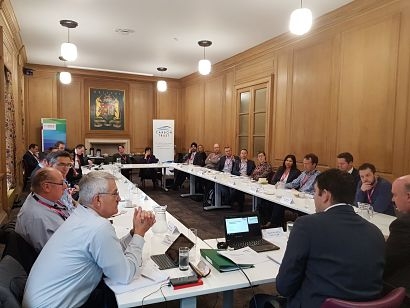
The roundtable workshop brought together a range of key players representing local authorities, Highways England, the Port of Bristol, Bristol Airport, grid operators, transport and logistics companies, public transport operators, property and infrastructure developers, universities and major local employers. Topics under discussion included: improving air quality; smart logistics and last mile delivery; encouraging shifts to different modes of transport, including towards walking and cycling; digitisation; meeting public transport needs; and how to ensure that existing and new build housing is ready for electric vehicles.
The West of England is home to several fast-growing communities, business hubs and globally connected distribution networks, all of which have changing transport needs. Decisions made during the workshop will have important ramifications for the future of the region, an area of the UK that currently has plans to deliver over 100,000 new homes and 80,000 new jobs.
Additionally, there are plans for major infrastructure investments underway, such as improved local rail services, mass rapid transport alongside upgrades to highway infrastructure and improved road network management. However, the region already has significant and rising problem with traffic congestion. Department for Transport projections show a future increase of 24 percent in total vehicle miles in the Bristol-Bath region, despite national trends of declining per capita travel. There is also an increasing focus on clean air issues.
To fulfil national obligations under the Climate Change Act, the UK will need to cut transport emissions by more than half by the middle of the 2030s. As part of this, transport in the West of England will undergo a rapid transformation.
The number of vehicles on the roads powered by electricity and alternative fuels is projected to go from the tens of thousands to the tens of millions. Delivering this will require huge changes in not only transport infrastructure, but also energy systems, digitisation, global supply chains, city planning, and even the financial system.
“The West of England Combined Authority’s priority is clean economic growth that benefits everyone in our region” said Tim Bowles, Mayor of the West of England. “Transport is crucial to this and by working together as a region, we can address the challenges that come with being an increasingly popular place to live and work. Improving public transport is essential to tackling congestion and reducing carbon emissions – this includes trains, buses, cycling and walking routes. We’re being ambitious with plans to improve our suburban rail network, open new railway stations, re-opening closed lines and exploring innovative light rail options to ensure we have a rail network which is fit for a cleaner future. We’re also looking at how new technology can help us become more sustainable with smart ticketing and on-demand services, including car-sharing, to give people more travel options and reduce the number of journeys.”
Myles McCarthy, Director of Implementation at the Carbon Trust, added that the decisions made during the workshop will have an impact for decades to come and that there is a need to ensure those decisions are the right ones.
“We know that we will see far more electric vehicles on the roads soon, which is already leading to changes in infrastructure” said Mr McCarthy. “But we also need to think about technologies that are coming further down the line, such as autonomous vehicles, delivery drones, and the use of artificial intelligence for dynamic transport planning. With the right plans in place, we can create healthier, more connected communities, and a prosperous economy for the West of England, at the same time as taking action on climate change and air pollution.”
For additional information:

